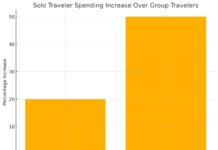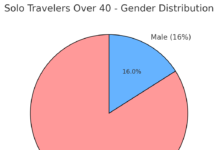The digital nomad lifestyle, characterized by remote work and the freedom to travel the world, has captured the imagination of many. But here’s the question: Should you embark on this exciting journey solo or with a partner? In this blog, we’ll delve into the pros and cons of being a solo digital nomad, helping you make an informed decision about whether flying solo is the right path for you.
The Pros of Being a Solo Digital Nomad
- Ultimate Freedom: One of the most significant advantages of going solo is the freedom to decide your itinerary and travel destinations entirely on your own terms. You don’t have to compromise or consider someone else’s preferences, allowing you to follow your heart and explore at your own pace.
- Personal Growth: Solo travel fosters personal growth and self-reliance. You’ll become more adaptable, confident, and resourceful as you navigate unfamiliar places and cultures independently. The challenges you face will become valuable life lessons.
- Networking Opportunities: Being alone can motivate you to step out of your comfort zone and meet new people. Solo travelers often find it easier to connect with locals and fellow nomads, leading to meaningful friendships and professional networking opportunities.
- Focused Work: Without distractions from a travel companion, you may find it easier to concentrate on your work. Solo digital nomads often report increased productivity and the ability to maintain a better work-life balance.
- Flexible Budgeting: Managing finances as a solo traveler is generally more straightforward. You have full control over your budget, allowing you to splurge on experiences that matter to you and save in areas that are less important.
The Cons of Being a Solo Digital Nomad
- Loneliness: Loneliness can be a significant downside of solo travel. While you’ll meet people along the way, there will inevitably be times when you long for meaningful human connection, especially during celebrations or important life events.
- Safety Concerns: Traveling alone can sometimes mean increased vulnerability, particularly in unfamiliar or potentially risky destinations. Personal safety should always be a priority, and being solo may necessitate extra precautions.
- Decision Fatigue: The constant need to make decisions, from choosing accommodations to planning routes, can lead to decision fatigue. Some solo travelers find this exhausting and long for a companion to share the decision-making load.
- Limited Support: When you face unexpected challenges, having a companion can be a source of support and comfort. Solo travelers may find it more challenging to navigate unforeseen obstacles, such as illness or emergencies.
- Costs Can Add Up: While solo travelers have control over their budget, they may not benefit from shared expenses, such as accommodations and transportation. This can make certain destinations less affordable when traveling alone.
Conclusion
The decision to become a solo digital nomad is a personal one, and it’s essential to weigh the pros and cons carefully. While the freedom and personal growth opportunities can be exhilarating, the potential for loneliness and increased responsibility should not be underestimated. Ultimately, whether you choose to go solo or share the journey with a companion, the digital nomad lifestyle offers unique experiences, challenges, and the chance to create a life that suits your individual desires and aspirations.
How to Choose the Best Cruise Company for Your Next Vacation

























